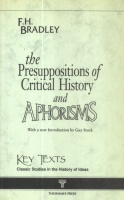kategóriák
- Közlekedés ajánlójegyzék
- Szocreál ajánlójegyzék
- Reklám ajánlójegyzék
- Fotó ajánlójegyzék
- Kínai-japán ajánlójegyzék
- Szentkép ajánlójegyzék
Új árakkal! - Új szentkép ajánlójegyzék II.
- 12 érdekes régiség
 Könyv
Könyv
 Bibliofilia
Bibliofilia
 Régiség
Régiség
 Metszet
Metszet
 Térkép
Térkép
 Fotó
Fotó
 Papírrégiség, Aprónyomtatvány
Papírrégiség, Aprónyomtatvány
 Plakát
Plakát
- Cirkusz
- Modern grafika
- Szocreál
- NER Irodalom
- Egyéb
kosár
üres a kosár
nincs bejelentkezve
Bradley F.H. : The Presuppositions of Critical History
- leírás
- további adatok
Series: Key Texts - Classic Studies in the History of Ideas.
Introduction by Guy Stock. This work combines two early pamphlets by F. H. Bradley (1846-1924), the foremost philosopher of the British Idealist movement. The first essay, published in 1874, deals with the nature of professional history, and foreshadows some of Bradley"s later ideas in metaphysics. He argues that history cannot be subjected to scientific scrutiny because it is not directly available to the senses, meaning that all history writing is inevitably subjective. Though not widely discussed at the time of publication, the pamphlet was influential on historian and philosopher R.G. Collingwood. The second pamphlet is Bradley"s critique of Henry Sidgwick"s The Methods of Ethics. Sidgwick was the first to propose the paradox of hedonism, which is the idea in ethics that pleasure can only be acquired indirectly. Published in 1877, this work is divided into three parts, treating Sidgwick"s definitions, arguments, and his view of ethical science.
Introduction by Guy Stock. This work combines two early pamphlets by F. H. Bradley (1846-1924), the foremost philosopher of the British Idealist movement. The first essay, published in 1874, deals with the nature of professional history, and foreshadows some of Bradley"s later ideas in metaphysics. He argues that history cannot be subjected to scientific scrutiny because it is not directly available to the senses, meaning that all history writing is inevitably subjective. Though not widely discussed at the time of publication, the pamphlet was influential on historian and philosopher R.G. Collingwood. The second pamphlet is Bradley"s critique of Henry Sidgwick"s The Methods of Ethics. Sidgwick was the first to propose the paradox of hedonism, which is the idea in ethics that pleasure can only be acquired indirectly. Published in 1877, this work is divided into three parts, treating Sidgwick"s definitions, arguments, and his view of ethical science.
| állapot: |      |
| kategória: | Könyv > Filozófia > |
| kategória: | Könyv > Idegennyelvű könyvek > Angol nyelvű > Angol nyelvű irodalom > |
| kiadó: | Thoemmes, 1993. Bristol, |
| cikkszám / ISBN: | 0046079 |
| kötés: | fűzve |
| oldalszám: | XXIX, IV, 66, [52] p. |
| könyv nyelve: | angol |









 Telefon:
Telefon: E-mail:
E-mail:







